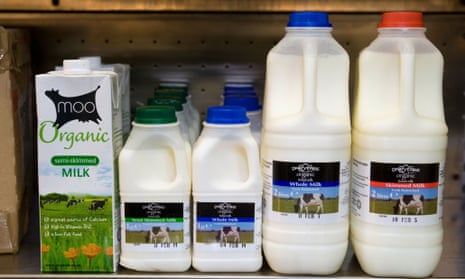As he looks out over the Irish Sea from his Welsh dairy farm, Hayden Evans is feeling optimistic. Rising sales of UK organic produce at home and overseas mean the market for his milk is looking safe. After more than 20 years as an organic farmer, he is now confident his son will be able to take over the running of the family’s 100-cow herd in Pembrokeshire later this year.
“I feared he would have to leave and do something else, but now it’s me who is going to be moved out to pastures new,” says Hayden.
In Gloucestershire, Flo Giles, farm manager of Nell’s Dairy, is similarly confident. She sells all of the milk from her 65-cow organic herd direct to consumers through three milk vending machines in the local region. Growing sales have encouraged her to start selling cartons of the milk online, too, from next month.
These and other organic dairy farmers are helping to buck the trend of decline in the dairy sector. As many as 1,000 dairy farmers are expected to quit the industry over the next year, after a drop in milk prices over the past six months.
“A couple of my dairy farming friends have had to cut back their herd numbers because they just can’t afford to look after them with the current milk price,” says Flo. “It’s heartbreaking for them.”
The future appears brighter for organic dairy farmers. Despite the cost-cutting tactics of supermarkets and the falling price of conventional milk, spending on organic dairy produce is up 6.5% over the past year, according to the Soil Association’s latest organic market report, with liquid milk sales up 2.9%. This compares with a 3% fall in the value of the conventional dairy sector.
Aldi and Lidl jump into organics
Dairy products now account for close to 30% of all spending on organic produce, with one in four shoppers buying organic milk over the past year, according to recent figures from the dairy farming cooperative OMSCo. And demand is not just from upmarket customers: discounters Aldi and Lidl saw the value of their year-on-year sales of organic milk grow by 410% and 166%, respectively.
Until recently, the organic dairy sector in the UK had been doing arguably worse than their conventional counterparts. A glut of supply in the early 2000s as farmers jumped to catch rising consumer interest in organic produce saw prices collapse. As farmers quit or switched back to conventional, organic milk production dropped by a quarter.
Those who survived the downturn have now benefited from a much smaller drop in prices over the past year. A cutback in supermarket listing and promotion has meant that some own-label organic dairy sectors have seen declines, but this has been offset by growing sales of branded produce. Sales figures for Yeo Valley, for example, were up 13% year-on-year.
Yoghurt sales soar
The biggest gains have been made in organic yoghurt – up 13.8% in value and 13% in volume – and exports of cheese and other dairy ingredients to overseas markets, particularly the US. Around 10% of the milk produced by OMSCo, which accounts for two-thirds of the UK’s organic milk production, is now being exported.
“Dairy is definitely the star performer in the organic sector,” says Soil Association market analyst Finn Cottle. “We’re still very much dependent on retailers in some sectors like milk and cheese, but the brands are helping to market the message of organics to people every day.”
The success of dairy brands like Yeo Valley points the way forward for the organic sector as a whole, suggests retail analyst Clive Black.
“To my mind organic food has to stand up more effectively in the basic functions of foodstuffs, which is most fundamentally about taste at a competitive price, with sustainability factors in tow. If organic milk can gain market share, selling off [the back of] its production methods, provenance and perhaps locality, then that is very encouraging for all concerned,” says Black, head of research at Shore Capital Stockbrokers.
Dairy farmers like Hayden, who supplies all of his milk to Rachel’s to make yoghurts, hopes that organics may finally move beyond the niche tag. “There was a feeling in the past that organic was synonymous with expense and a number of people tried to adjust the marketing away from that misconception. I think we’re seeing the result of that now,” he says.
Join the community of sustainability professionals and experts. Become a GSB member to get more stories like this direct to your inbox.

Comments (…)
Sign in or create your Guardian account to join the discussion